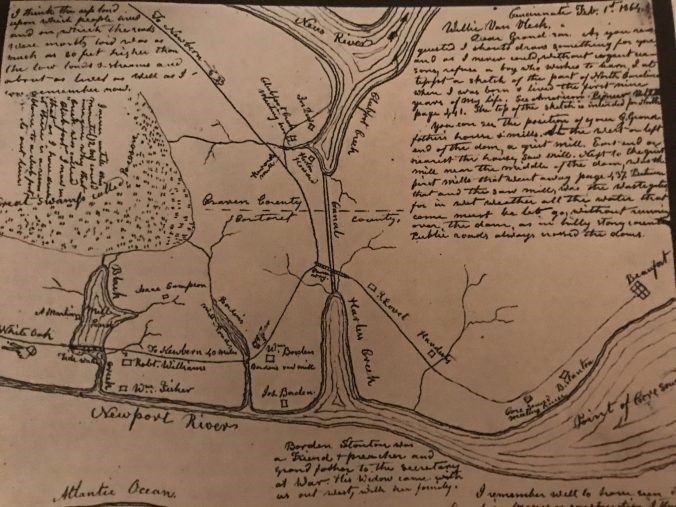
Map by John Shoebridge Williams, from Milton Franklin Williams, “The Williams History: Tracing the Descendants in America of Robert Williams, of Ruthin, North Wales, who Settled in Carteret County, North Carolina, in 1763.” (Cincinnati, Ohio, 1921).
The Midwestern Friends

What if your Quaker ancestors didn’t just land and settle in with a Meetinghouse and associated records in the Minutes Books? What if they were not only advocates but dedicated to a movement? Were your ancestors part of the Hicksite movement, Congressional, or the Orthodox? What if they left North Carolina and Kentucky and moved to Ohio, or another Midwestern State.
Where to Begin Quaker Research
 |
| Monthly Meetings in North America, A Quaker Index, Thomas Clark Hill, pg 213 |
Quaker researchers know the key to tracing Quaker ancestry begins with the following reference books:
- Monthly Meetings in North America, A Quaker Index, Thomas Clark Hill.[1]
- Encyclopedia of American Quaker Genealogy, Volume I -V, Wm Wade Hinshaw[2]
The Issue
Records are everywhere! Once again the genealogists must put
on one’s ferreting cap for this research. Yes, there are quite a few records
online, some of the Society of Friends cemeteries, Monthly Meeting Minutes, and
more; but, historical research on the Meetinghouses of interest is vital to any
to understand the migratory paths, the original and the settlements of our
Friends’ ancestors.
The good news is that many of the Quaker records are extant; just keep in mind the following:
- Records are not centrally housed
- Members jumped from one Meetinghouse to another relocation
- They followed idealistic and cultural changes based on the era and timeframe.
- Meetinghouses were often absorbed by a neighboring Meeting due to internal influences, i.e. low membership.
- Rarely do the Minutes note their members by race. Therefore, each member of interest requires individual full genealogical research on each of the viable candidates. Why? -because many of the African American Quakers (or those who lived in the communities); or moved from NC to the Midwest with the Quakers, carried the same names. So don’t get caught with the wrong “Charles Osborn.”
Where to Research Midwestern Quaker Records?
Sure, your research still follows standard collections - to include deeds, wills, probates, obituaries, newspapers, etc., but understanding the climate and the times is vital:· “A Great and Good People” Midwestern Quakers and the Struggle Against Slavery, Hamm Thomas D, Indiana Magazine of History, Vol 100, No 1 (March 2004) pp3-25; online access: Jstor.
- Highland Ohio Conductors, The Underground Railroad from Slavery to Freedom, online access: gutenberg.org
- Allen County Public Library, “Quakers”collection
For Abolitionists and African American Friends Research
- a3Genealogy blog articles:
- Quaker Heritage Center, at Wilmington, Quaker College.
- Earlham College, IN
- Free Black Communities and the Underground Railroad; Geography of Resistance, Cheryl Janifer LaRoche, 2013 Indiana and Ohio
- Wilberforce College, HBCU
- Quaker Heritage: Chester Meeting House
- Harveysburg Free black school in Warren County, OH, museum
- Greene County Ohio Archives, manumissions black populations, Wilberforce College
Just to get you started!
Note: The a3Genealogy Research Team, recently
completed two large Friends - Quakers, Abolitionists and Underground Railroad
projects. This does not include the
recent project on the Midwestern Quakers and the Impact of Ohio and Indiana
Native Americans. This white paper is forthcoming.
[1] 1997, University of Wisconsin - Madison.
[2] Publisher: Genealogical Publishing Co., Inc. 1973, Baltimore
Accurate Accessible Answers
a3genealogy@gmail.com





